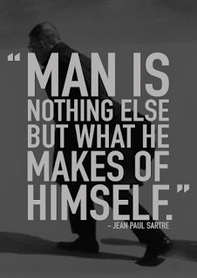
Existentialism is a philosophical movement of the late 19th and 20th Century that has a very loose definition; even those philosophers that we might categorise as existentialist such as Sartre and Camus actually denied that they are existentialists!
Nevertheless there are some broad, common features:
1. Philosophy is a way of life: rather than being just another academic subject or a fun past-time, philosophy should be an all pervading activity that is essential to your life. Questions of how to live your life are crucial and philosophy can help you deal with these questions.
2. Freedom: There is an assumption in the thinking of existentialists that we are absolutely free to will as we would like. However for some, such as Sartre, this was a source of anxiety – in his words “we are condemned to be free”. By this he means that we cannot rely upon a deity or society to make choices on our behalf. We are personally responsible for our actions - this idea has its origins in the ideas of philosophers such as Kant.
| 3. No Absolutes: By and large existentialist philosophers say that life is full of anguish for humanity because there are no objective or universally known truths. It is up to us to create value in our own lives and live it for ourselves. 4. Not just Rationality: Philosophy should not be a purely rational process but has subjective elements too; this combination is the only way to counter the absurdity of the world – we need to create our own order and understanding in order to avoid a sense of disorientation that comes about from the meaningless world we live in. |
Existentialism has had a number of important influences upon other areas of life such as the Arts and Psychology. Interestingly it did not have such a strong influence upon the rest of Philosophy as you might think; put simply the subject moved on, new ideas took over and existentialism became less popular. One area that you might well think about existentialism at A-level is when studying the issue of Free-Will and Determinism and more specifically the approach of Libertarianism – the idea that we are totally free in our moral choices.
I hope that this satisfies my inquiring student and that more students ask for other terms to be explained in the future!




 RSS Feed
RSS Feed
